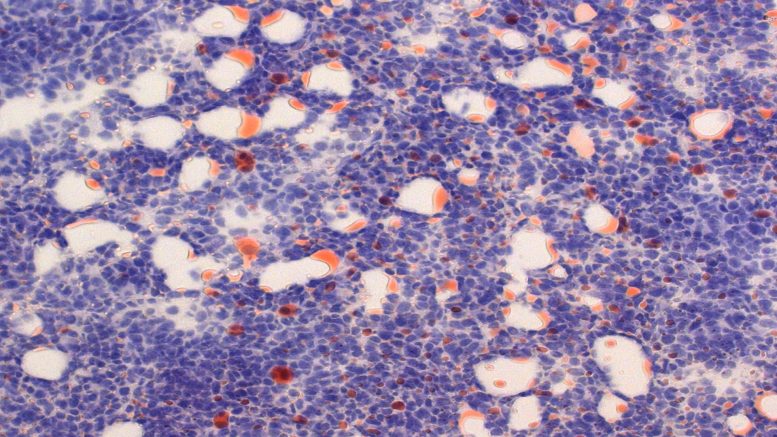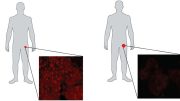
In mice with pancreatic and colorectal cancer, keto diets slow the growth of tumors, seen here in white, by a process called ferroptosis. This kills the cancer cells by causing a lethal buildup of toxic fatty molecules, stained red. Credit: Janowitz lab/Cold Spring Harbor Laboratory
Dietitians claim that a ketogenic diet can potentially facilitate a reduction of up to 10% of your body weight. These meal plans, characterized by high fat and low carbohydrate content, stimulate the body to burn its own fat reserves. However, they may also aid in combating various cancers by depriving tumors of the glucose necessary for their growth. At first glance, this appears to be an optimal approach. However, research indicates that these diets might carry a lethal, side effect for individuals battling cancer.
Studies conducted on mice with pancreatic and colorectal cancer have shown that a ketogenic diet may hasten the onset of a deadly wasting disease known as cachexia. Both human patients and mice suffering from cachexia manifest symptoms such as diminished appetite, significant weight loss, fatigue, and weakened immunity. Unfortunately, there is no effective treatment for this disease, which is responsible for approximately 2 million fatalities annually.
“Cachexia results from a wound that doesn’t heal,” Cold Spring Harbor Laboratory (CSHL) Assistant Professor Tobias Janowitz says. “It’s very common in patients with progressive cancer. They become so weak they can no longer handle anti-cancer treatment. Everyday tasks become Herculean labors.”

Cachexia is a complex metabolic syndrome that is associated with an underlying disease. It is characterized by the loss of muscle mass, and possibly fat mass, often accompanied by a loss of appetite, or anorexia. Other key features of cachexia include an increase in inflammation, resistance to insulin, and an elevation in protein breakdown.
Janowitz and CSHL Postdoc Miriam Ferrer are working to divorce keto’s cancer-fighting benefits from its lethal side effect. They found pairing keto with common drugs called corticosteroids prevented cachexia in mice with cancer. Their tumors shrank and the mice lived longer.
“Healthy mice also lose weight on keto, but their metabolism adapts and they plateau,” Janowitz explains. “Mice with cancer can’t adapt, because they can’t make enough of a hormone called corticosterone that helps regulate keto’s effects. They don’t stop losing weight.”
Keto causes toxic lipid byproducts to accumulate in and kill cancer cells by a process called ferroptosis. This slows tumor growth but also causes early-onset cachexia. When researchers replaced the depleted hormone with a corticosteroid, keto still shrank tumors but didn’t kickstart cachexia.
“Cancer is a whole-body disease. It reprograms normal biological processes to help it grow,” Ferrer says. “Because of this reprogramming, mice can’t use the nutrients from a keto diet, and waste away. But with the steroid, they did much better. They lived longer than with any other treatment we tried.”
Janowitz and Ferrer are part of an international Cancer Grand Challenges effort taking on cancer cachexia. They recently published an authoritative overview of the condition. The team is now working to fine-tune corticosteroid timing and dosage to widen the window for effective cancer therapies in combination with keto.
“We want to push back against cancer even harder, so it grows slower still,” Janowitz says. “If we can broaden this effect, make the treatment more efficient, we can ultimately benefit patients and improve cancer therapeutics.”
Reference: “Ketogenic diet promotes tumor ferroptosis but induces relative corticosterone deficiency that accelerates cachexia” by Miriam Ferrer, Nicholas Mourikis, Emma E. Davidson, Sam O. Kleeman, Marta Zaccaria, Jill Habel, Rachel Rubino, Qing Gao, Thomas R. Flint, Lisa Young, Claire M. Connell, Michael J. Lukey, Marcus D. Goncalves, Eileen P. White, Ashok R. Venkitaraman and Tobias Janowitz, 12 June 2023, Cell Metabolism.
DOI: 10.1016/j.cmet.2023.05.008
The study was funded by the “la Caixa” Foundation, the MRC Cancer Unit, Cancer Grand Challenges, Cancer Research UK, the Mark Foundation For Cancer Research, Cold Spring Harbor Laboratory, Cold Spring Harbor Laboratory Cancer Center, the National Institutes of Health, CK Hutchison Holdings Limited, the University of Cambridge, Atlantic Philanthropies, and the Medical Research Council.








Be the first to comment on "Keto Diet: The Dark Side of a Promising Cancer Weapon"